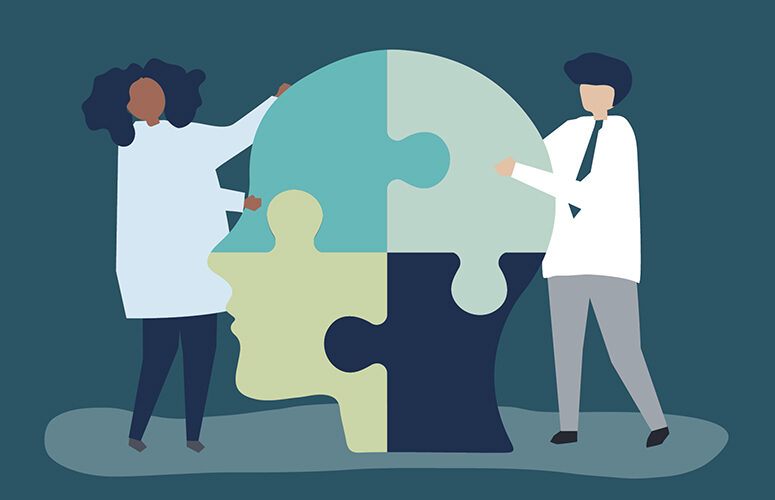
Research Documents Pandemic’s Effect on New Jerseyans’ Mental Health
On Sep 7, 2023Research published by the William J. Hughes Center for Public Policy at Stockton University investigated how New Jersey residents with specific mental health issues fared during the pandemic and whether COVID-19 worsened those problems.
They evaluated data from before and after the pandemic began within the context of national and global trends to determine if those changes could be attributed to the pandemic or not.
Results indicate the pandemic was at least partly responsible for negatively affecting certain mental health issues, including anxiety, depression, stress-related problems and post-partum depression, especially among young people.
A statewide Stockton Poll conducted as part of the research corroborated trends found in the analysis, with 30% saying COVID worsened mental health problems, including those involving alcohol and drug use. A majority experienced disruptions in their lifestyle, with one in three saying those disruptions worsened their mental health.
“We have heard anecdotally and from some reports that the pandemic hurt mental health in New Jersey,” said John Froonjian, director of the Hughes Center. “This research validates those concerns and documents specific areas of mental health that were affected.
“When COVID-19 first spread, officials and doctors appropriately rushed to protect the public’s physical health with little ability early on to gauge the mental health impact. The value of this Hughes Center report is to show where we need to be prepared during the next public health crisis,” Froonjian said.
Their report identified a number of trends in the data. Highlights include:
- The number of diagnoses for depression, anxiety and trauma or stress-related disorders increased in 2020 over the prior year.
- Analyses confirmed that young people, especially teenagers, experienced the largest increase in anxiety, depression and related disorders.
- Self-reported rates of depression in pregnant and postpartum women increased in 2020.
- Reports of child maltreatment decreased during the pandemic, though it remains unclear if this reflected an actual decline in abuse or a decrease in detection and reporting, potentially due to pandemic-related factors.
- The use of telehealth forms of mental health treatment dramatically increased during the pandemic and remained elevated into 2022.
- Between September 2020 and April 2022, anywhere from 7%-11% of adult residents reported needing but not obtaining mental health treatment, highlighting a treatment gap in New Jersey.
- Additionally, in 2020 and 2021, an estimated 60% of individuals needing substance abuse treatment did not obtain it.
The report examined how different populations fared. A common thread identified by the researchers is that young people were impacted by the pandemic to a larger extent than older residents. For example, the increases in diagnoses for depression, anxiety and trauma or stress-related disorders were largest among 15-20-year-olds.
A Stockton Poll also found stark generational divides with younger residents more likely to say the pandemic impacted their mental health and that they needed treatment. Those ages 18-29 said the pandemic caused or worsened a mental health problem at a rate of 45% compared to a rate of 13% among those 65 and older.
Stockton University Poll findings
A poll of 664 adult New Jersey residents conducted by the Hughes Center in March and April as part of this larger study corroborated the main results of the faculty-student research. It also highlighted lifestyle changes brought on by the pandemic.
- 30% of respondents said the pandemic caused their mental health to worsen, according to the poll.
Nearly one in five residents said their alcohol or recreational drug consumption increased during the pandemic. For 40% of these individuals, it remains elevated. - The most common ways people managed pandemic-related stress was by engaging more with family and friends (20%), exercising (19%) or watching TV (16%).
- Almost two thirds said their lifestyle routines were disrupted by the pandemic either temporarily (16%) or permanently (49%). When asked to name the top two that were most impacted, social life (70%) and exercise (24%) were cited.
Residents were split evenly on the impact of these disruptions, with 32% saying the lifestyle changes made their mental health worse and the same rate saying they made it better, while 30% had mixed feelings in that some changes made it better and some made it worse.
The poll also captured the historic job loss spurred by the pandemic. More than one-fourth (28%) said they had a change of employment during the crisis, a plurality of whom said the change worsened their mental health. For about half, this change constituted temporary or permanent job loss, while others changed roles or switched careers entirely.
The vast majority said their religious or spiritual practices did not change due to the pandemic (75%) or that their practices were temporarily disrupted but they have since returned to them (9%).
To access more business news, visit NJB News Now.
Related Articles:





